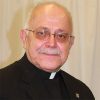Paul maintained that if salvation were possible simply by obeying rules, then Christ’s death was in vain. Lucky for us, Paul’s argument carried the day. Almost overnight Christianity went from being a small sect within Judaism to becoming a world religion with universal appeal.
In recent decades Maryknoll has faced a similar, albeit less drastic, dilemma. We wrestled with the question: Do men who desire to join Maryknoll first have to become U.S. citizens, or at least be legal residents of the United States?
To understand the dilemma, it is important to understand the historical background. When the Maryknoll Society was founded in 1911, the Church in the United States had only been off the list of mission-receiving churches for three years, having been catechized for centuries by foreign missioners from Europe. Now the United States itself was ready to send missioners to “fields afar” to proclaim the Gospel to those who had never heard its message. Maryknoll founders Fathers James A. Walsh and Thomas F. Price recognized the need to establish a society of priests and brothers who would be trained to do just that on behalf of the U.S. bishops.
For most of our 111 years, then, the majority of our members were U.S. citizens and descendants of white European immigrants. What’s more, the goal of our overseas mission work was to help establish the Church where it was weak or nonexistent. How could we take vocations from countries that had few, if any, native clergy or religious?
Over the years the focus of mission expanded. When Maryknollers were expelled from China, our first mission, following the communist takeover, the “old China hands,” as those early missioners were called, had to look for new mission fields. While some went to Taiwan, others opted to go to Latin American countries and the Philippines, which were already Catholic. There they shared their faith with believers who needed encouragement to put their faith into practice, often in the face of oppression and injustices surrounding them.
In recent decades, vocations to Maryknoll shifted with the immigrant populations. Along with descendants of those who came from Europe, new immigrants and refugees to the United States began coming from Latin America and Asia. At the same time, many U.S. bishops began recruiting priests and seminarians from abroad, including Africa, where religious vocations are growing exponentially.
The world, the Church and the United States have changed a lot since 1911. We now realize that mission is from everywhere to everywhere, as we challenge others and ourselves to reflect the Gospel in our lives.
And so our 14th General Chapter reaffirmed a new policy of accepting vocations from our mission areas. “That’s an enormous change for our Society, our self-understanding and our understanding of the Church,” says Maryknoll Fathers and Brothers’ new Superior General, Father Lance Nadeau. He reiterates that sharing the Gospel no longer means only going from the North to the needy South.
God willing, in June of 2022, the ordination of John Siyumbu will be our first official ordination of a vocation from our overseas mission, in this case, Kenya. The Maryknoll Society is now blessed with 18 candidates, many from our overseas missions who are not U.S. citizens. These men are attracted to the Maryknoll spirit and wish to join our mission efforts. With their acceptance as members, Maryknoll will reflect the Church and world we go to serve. Our founders would surely be proud.
Featured image: Maryknoll Father Russell Feldmeier, the Society’s rector of initial formation, welcomes new candidates to the Maryknoll residence in Chicago. (Rodrigo Ulloa/U.S.)
![]()

